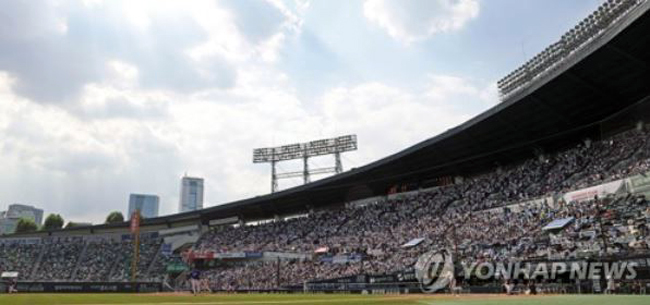Players in the nation's top baseball league will be allowed to have agents starting next year.
The Korea Baseball Organization said it will permit player representation beginning in 2018, putting into effect a rule that was initially introduced in 2001.
Following a meeting of its board of directors, the KBO said only those who have passed a qualification test set by the Korea Professional Baseball Players Association will be allowed to represent KBO players. Each agent or agency may only work with a maximum 15 players, and with no more than three players from the same club.
In February last year, the government said it would encourage athlete representation in domestic professional sports, saying the absence of proper representation has hindered the development of management, marketing and public relations within the sports industry.
 |
This file photo, taken Sept. 3, 2017, shows a Korea Baseball Organization regular season game between the home team Doosan Bears and the Samsung Lions at Jamsil Stadium in Seoul. (Yonhap) |
Currently, a KBO player must directly deal with his club in contract negotiations, and no other representative is permitted to sign a contract for the player.
The KBO agreed in 2001 to allow players to have representation but had been withholding the formal introduction of this system, citing the need for discussion among the KBO, its clubs and the players association regarding the league's circumstances.
Previously, the KBO has been wary of the negative impact of having agents handle contract negotiations. Its officials have said agents could drive up players' salaries and affect clubs' bottom lines. They also feared the risks of having only a few super agents dictating the whole market.
In December 2014, the Seoul Bar Association filed a complaint with the Fair Trade Commission that the KBO had violated anti-monopoly and fair trade laws by not putting an agent system into effect. The lawyers' group argued that it was inherently unfair for the KBO to allow only players to enter contract negotiations when they have little leverage or legal knowledge.
Proponents of having agents for players have said the system will have positive long-term effects on KBO clubs. Since agents will be coming to negotiating tables armed with statistics, it will also force teams to accumulate numbers and facts and determine players' wages with more objective data, they said.
In another rule change instituted at the board meeting, the KBO tightened rules for national team selection.
Players who have been sentenced or have received a suspended jail term within the past 12 months will be left off the national team. Also, those who have been disciplined by the KBO for match fixing, gambling, sex crimes or drug-related offenses will also not be able to represent the country.
The KBO previously faced a backlash for selecting St. Louis Cardinals' reliever Oh Seung-hwan and Kia Tigers' reliever Lim Chang-yong, two players convicted of and fined for gambling charges, at the World Baseball Classic earlier this year.
Pittsburgh Pirates' third baseman Kang Jung-ho, who was arrested for fleeing the scene of a drunk driving accident last December, was put on the preliminary WBC roster before missing the final cut. (Yonhap)







![[Today’s K-pop] Blackpink’s Jennie, Lisa invited to Coachella as solo acts](http://res.heraldm.com/phpwas/restmb_idxmake.php?idx=644&simg=/content/image/2024/11/21/20241121050099_0.jpg)
